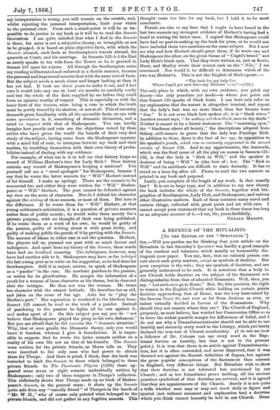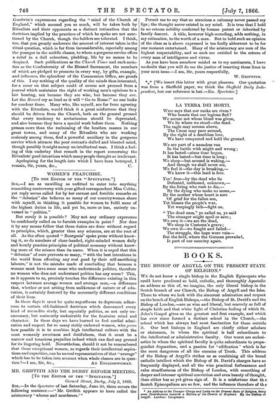A DEFENCE OF THE RITUALISTS.
[To THE EDITOR_OF THE " SPECTATOR."] SIR,—Will you pardon me for thinking that your article on the Ritualists in last Saturday's Spectator was hardly a good example of the candour and tolerance which usually so honourably dis- tinguish your paper. You say, first, that no rational person can care about such petty matters, except as symbols of doctrine. But your exception is the rule ; they are symbols of doctrine, and are generally understood to be such. It is notorious that a body in our Church holds doctrine on the subject of the Sacrament not distinguishable from that of educated Romanists. Well, then, you say, " Let such men go to Rome." But, Sir, this question, the right to remain in the English Church while holding on certain points doctrine approaching that of Rome, was the very issue raised by the famous Tract 90, and now as far from decision as ever, or rather virtually decided in favour of the Romanizers. Why should they not remain where they are ? The Church of England, purposely, as most believe, has worded her Communion Office so as to leave the widest possible margin for differences of belief, and I do not see why a Transubstautiationist should not be able to use heartily and sincerely every word in the Liturgy, which you lately declared the true test of Church membership. (I do not see how a follower of Dr. Coleus() can use every word in the Bap- tismal Service as heartily, but that is not to the present point.) It is true that there is an article against Transubstantia- tion, but it is often contended, and never disproved, that it was directed not against the Romish definition of dogma, but against the gross popular conceptions of the Sacrament then current in England, very different things. But Ritualists wish to show that their doctrine is not tolerated but sanctioned by our Church ; and as her formularies prove nothing, all the ancient practices symbolical of that doctrine are revived, and it is agreed that they are appointments of the Church. Surely it is not quite a trifle whether men may or may not teach daily in figure and symbol (not without comment and explanation too) a doctrine which you think cannot honestly be held in our Church. Dean Goodwin's expressions regarding the " mind of the Church of England," which amused you so much, will be taken both by Ritualists and their opponents as a distinct intimation that the doctrines implied by the practices of which he spoke are not sanc- tioned by the Church, though the holders are tolerated. I think, too, that you greatly underrate the amount of interest taken in the ritual question, which is far from inconsiderable, especially among the younger in the middle classes, to whom a gorgeous service offers a relief in a dull colourless, plodding, life by no means to be despised. Such publications as the Church Times and such socie- ties as the Confraternity of the Blessed Sacrament, the members of which are pledged to promote in every way, by gifts, example, and influence, the splendour of the Communion Office, are proofs of this. I say nothing of the quality of the minds thus interested, for a sneer on that subject could of course not proceed from a journal which maintains the right of working men's opinions to a fair hearing, not because they are wise, but because they are. Let the Record cry as loud as it will " Go to Rome !" no one looks for candour there. Many who, like myself, are far from agreeing with the Ritualists, would think it a great misfortune that they should be driven from the Church, both on the general ground that every tendency to sectarianism should be deprecated, and also because they have a special work before them. Nothing presses more than the reclaiming of the heathen masses in our great towns, and many of the Ritualists who are working zealously among these, find a powerful auxiliary in the gorgeous service which attracts the poor outcast's dulled and blunted mind, though possibly it might annoy an intellectual man. I think a feel- ing of this underlay that remark in the report concerning the Ritualists' good intentions which many people thought so irrelevant.
Apologizing for the length into which I have been betrayed, I































 Previous page
Previous page